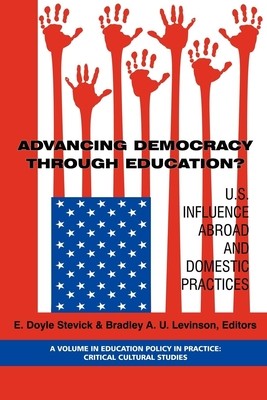
- We will send in 10–14 business days.
- Publisher: Information Age Publishing
- Year: 2008
- Pages: 312
- ISBN-10: 1593116551
- ISBN-13: 9781593116552
- Format: 15.6 x 23.4 x 1.9 cm, hardcover
- Language: English
- SAVE -10% with code: EXTRA
Advancing Democracy Through Education? U.S. Influence Abroad and Domestic Practices (Hc) (e-book) (used book) | bookbook.eu
Reviews
Description
A volume in Education Policy in Practice: Critical Cultural Studies Series Editors Bradley A. U. Levinson, and Margaret Sutton, Indiana University This book explores the diversity of American roles in education for democracy cross-culturally, both within the United States and around the world. Cross-cultural engagement in education for democracy inevitably bears the impressions of each culture involved and the dynamics among them. Even high-priority, well-funded U.S. government programs are neither monolithic nor deterministic in their own right, but are rather reshaped, adapted to their contexts, and appropriated by their partners. These partners are sometimes called "recipients", a problematic label that gives the misleading impression that partners are relatively passive in the overall process. The authors pay close attention to the cultures, contexts, structures, people, and processes involved in education for democracy. Woven throughout this volume's qualitative studies are the notions that contacts between powers and cultures are complex and situated, that agency matters, and that local meanings play a critical role in the dynamic exchange of peoples and ideas. The authors span an array of fields that concern themselves with understanding languages, cultures, institutions, and the broad horizon of the past that shapes the present: history, anthropology, literacy studies, policy analysis, political science, and journalism. This collection provides a rich sampling of the diverse contexts and ways in which American ideas, practices, and policies of education for democracy are spread, encountered, appropriated, rejected, or embraced around the world. This volume introduces concepts, identifies processes, notes obstacles and challenges, and reveals common themes that can help us to understand American influence on education for democracy more clearly, wherever it occurs.
EXTRA 10 % discount with code: EXTRA
The promotion ends in 18d.08:22:08
The discount code is valid when purchasing from 10 €. Discounts do not stack.
- Publisher: Information Age Publishing
- Year: 2008
- Pages: 312
- ISBN-10: 1593116551
- ISBN-13: 9781593116552
- Format: 15.6 x 23.4 x 1.9 cm, hardcover
- Language: English English
A volume in Education Policy in Practice: Critical Cultural Studies Series Editors Bradley A. U. Levinson, and Margaret Sutton, Indiana University This book explores the diversity of American roles in education for democracy cross-culturally, both within the United States and around the world. Cross-cultural engagement in education for democracy inevitably bears the impressions of each culture involved and the dynamics among them. Even high-priority, well-funded U.S. government programs are neither monolithic nor deterministic in their own right, but are rather reshaped, adapted to their contexts, and appropriated by their partners. These partners are sometimes called "recipients", a problematic label that gives the misleading impression that partners are relatively passive in the overall process. The authors pay close attention to the cultures, contexts, structures, people, and processes involved in education for democracy. Woven throughout this volume's qualitative studies are the notions that contacts between powers and cultures are complex and situated, that agency matters, and that local meanings play a critical role in the dynamic exchange of peoples and ideas. The authors span an array of fields that concern themselves with understanding languages, cultures, institutions, and the broad horizon of the past that shapes the present: history, anthropology, literacy studies, policy analysis, political science, and journalism. This collection provides a rich sampling of the diverse contexts and ways in which American ideas, practices, and policies of education for democracy are spread, encountered, appropriated, rejected, or embraced around the world. This volume introduces concepts, identifies processes, notes obstacles and challenges, and reveals common themes that can help us to understand American influence on education for democracy more clearly, wherever it occurs.


Reviews